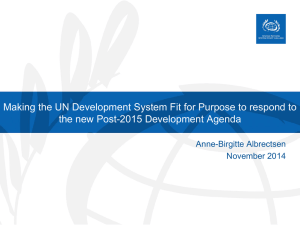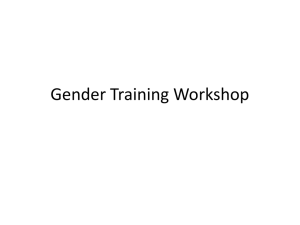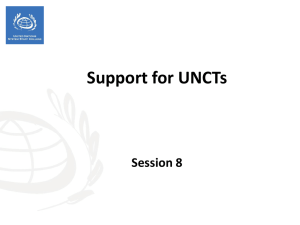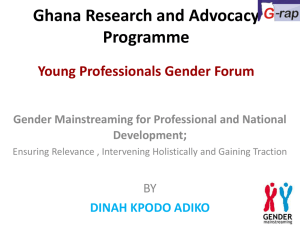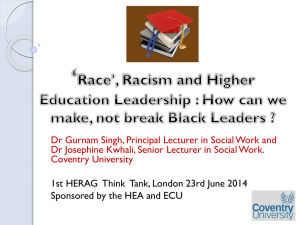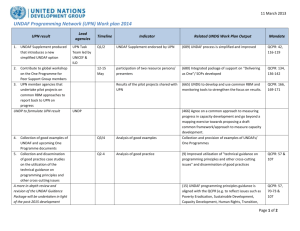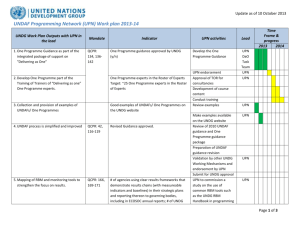TTGE Minutes and Action Points for 20 Feb 2013
advertisement
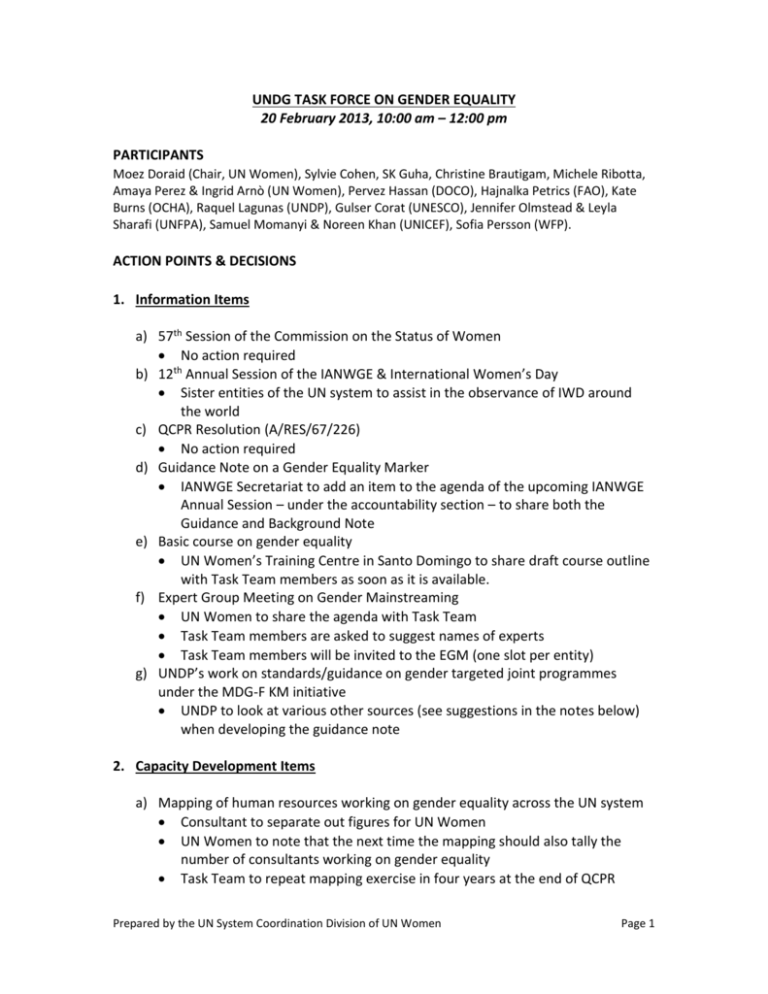
UNDG TASK FORCE ON GENDER EQUALITY 20 February 2013, 10:00 am – 12:00 pm PARTICIPANTS Moez Doraid (Chair, UN Women), Sylvie Cohen, SK Guha, Christine Brautigam, Michele Ribotta, Amaya Perez & Ingrid Arnò (UN Women), Pervez Hassan (DOCO), Hajnalka Petrics (FAO), Kate Burns (OCHA), Raquel Lagunas (UNDP), Gulser Corat (UNESCO), Jennifer Olmstead & Leyla Sharafi (UNFPA), Samuel Momanyi & Noreen Khan (UNICEF), Sofia Persson (WFP). ACTION POINTS & DECISIONS 1. Information Items a) 57th Session of the Commission on the Status of Women No action required b) 12th Annual Session of the IANWGE & International Women’s Day Sister entities of the UN system to assist in the observance of IWD around the world c) QCPR Resolution (A/RES/67/226) No action required d) Guidance Note on a Gender Equality Marker IANWGE Secretariat to add an item to the agenda of the upcoming IANWGE Annual Session – under the accountability section – to share both the Guidance and Background Note e) Basic course on gender equality UN Women’s Training Centre in Santo Domingo to share draft course outline with Task Team members as soon as it is available. f) Expert Group Meeting on Gender Mainstreaming UN Women to share the agenda with Task Team Task Team members are asked to suggest names of experts Task Team members will be invited to the EGM (one slot per entity) g) UNDP’s work on standards/guidance on gender targeted joint programmes under the MDG-F KM initiative UNDP to look at various other sources (see suggestions in the notes below) when developing the guidance note 2. Capacity Development Items a) Mapping of human resources working on gender equality across the UN system Consultant to separate out figures for UN Women UN Women to note that the next time the mapping should also tally the number of consultants working on gender equality Task Team to repeat mapping exercise in four years at the end of QCPR Prepared by the UN System Coordination Division of UN Women Page 1 b) UNDG Gender Experts Roster for the UN system Task Team members to submit comments to the outline of the core curriculum within one week. Task Team Secretariat to circulate for feedback the TOR for the consultant who will develop the curriculum in the coming weeks Task Team members to investigate how many resources they can contribute to share the financial costs of this initiative NOTES Item 1: Information Items a) 57th Session of the Commission on the Status of Women Christine Brautigam (Executive Secretary of the CSW) briefed participants on the themes of the 57th Session of the Commission. Namely the: Priority theme – Elimination and prevention of all forms of violence against women and girls; Review theme – The equal sharing of responsibilities between women and men, including caregiving in the context of HIV/AIDS (agreed conclusions from the fifty-third session); Emerging issue – Key gender equality issues to be reflected in the post2015 development framework; and Preview on the priority theme of 2014 – Challenges and achievements in the implementation of the Millennium Development Goals for women and girls. She went on to note that once the agreed conclusions are adopted by Member States, is when the work for UN entities really starts as they support Member States in implementing them. An Executive Directors’ Forum is to take place on 5 March, hosted by Michelle Bachelet at which a joint statement will be issued. b) 12th Annual Session of the IANWGE & International Women’s Day The 12th Annual Session of the IANWGE is taking place from 27 February to 1 March. The agenda has been shared and in it are some salient sessions on accountability, the status of women in the UN system, gender equality in the Post-2015 development agenda. The gender mainstreaming session will focus on capacity building. This year there was a deliberate effort to diversify the agenda and its format so as to make it more action oriented. The 2013 theme for International Women’s Day (IWD) is: “A promise is a promise: Time for action to end violence against women”. It is expected to focus on women in vulnerable situations, the elderly, youth, women with disabilities etc. The main event on 8 March will include the Secretary-General, Michelle Bachelet and will be Prepared by the UN System Coordination Division of UN Women Page 2 the launch of the “One Woman” song. UN Women looks to sister entities of the UN system to assist in the observance of IWD around the world. c) QCPR Resolution (A/RES/67/226) On 21 December 2012, the UN General Assembly adopted a landmark resolution (A/RES/67/226) on the quadrennial comprehensive policy review of UN operational activities for development (QCPR). The QCPR will frame the operational activities of the UN funds, programmes and specialized agencies for the period 2013-2016. A detailed implementation plan will be forwarded to all UN entities by the Department of Economic and Social Affairs in consultation with the UNDG. The next set of UNDG Strategic Priorities will be fully aligned with the QCPR both in content and in duration. The ASG Advisory Group recommends that the UNDG also develop a common action plan on the implementation of the QCPR, which streamlines and prioritizes the mandates contained in the QCPR. There is an unprecedented opportunity to capitalize on this strong QCPR on gender equality. This Task Team was instrumental in developing and communicating a unified message on gender equality through the side event organized during ECOSOC 2012. Section D of the resolution which is on gender equality and women’s empowerment is both strong and functional asking all UN entities to increase their investment and focus on gender equality and women’s empowerment in outcomes and outputs of UNDAFs and with a solid emphasis on accountability – with references to UN-SWAP and the Scorecard developed by this same Task Team. d) Guidance Note on a Gender Equality Marker The Guidance Note was submitted to the UPN last summer which endorsed it, safe one UN entity namely UNDESA. The Chair of the Task Team as well as other colleagues who have worked on the development of the Guidance Note have helped in discussing this with UNDESA. On 31 January 2013 the Executive Director of UN Women sent a letter to the USG of the Department of Management to request his support to move the Guidance Note’s approval process through the three pillars of the CEB. It was suggested that the HLCP and HLCM could consider and approve this item virtually while the UNDG would be giving it its full consideration first through the ASG advisory group and then the Principals. There has been a succession of inter-governmental calls for the use of gender markers both by ECOSOC in 2012 and more recently in the QCPR resolution. UN Women will develop a briefing note which the members of the Task Team can use to brief their respective heads. It was further suggested that an item dedicated to share both the Guidance and Background Note (which was developed by the Subgroup on Accounting for Prepared by the UN System Coordination Division of UN Women Page 3 Resources for Gender Equality co-chaired by UNDP and UNICEF) be added to the agenda of the upcoming IANWGE Annual Session – under the accountability section. e) Basic course on gender equality The draft outline is ready with content for a total of six modules which is currently undergoing an internal review. It is expected that the next draft, in the coming weeks, will be shared with UN system colleagues for a peer review. The basic course is not mandatory but will be available to all UN entities for their use. The e-course will reference more technical courses but will not delve into technical aspects of gender equality rather it aims at triggering behavioural changes by providing background information and general knowledge on gender equality and the empowerment of women. It is a modular course intended for all staff, from heads of organizations to messengers and drivers. f) Expert Group Meeting on Gender Mainstreaming organized by UN Women The focus of the EGM is on the substantive (thematic) content and components of gender mainstreaming strategies in national policies and programmes (rather than institutional aspects of, and compliance with, gender mainstreaming corporate performance standards). Both the ECOSOC resolution on gender mainstreaming and the GA resolution on QCPR have mandated to strengthen gender mainstreaming in UN development cooperation, especially at the country level. The EGM will take place from 30 April to 3 May 2013 at the UN Women training centre in Santo Domingo, Dominican Republic. The outcome of the EGM will be a report, with recommendations directed at the UN system, donors and member states. The EGM proceedings will be used to update a state-of-the-art Guidance Note on Gender Mainstreaming for the entire UN System that UN Women has been mandated to revise (the previous one is over a decade old). In February, a pre-EGM on-line discussion invited members of the UNDG Task Team, amongst others, to provide inputs on implementation of gender mainstreaming. Within IANWGE, the inputs of the Task Team members to the EGM itself and the revision of the guidance note are critical because the entities that are part of the UNDG Task Team on Gender Equality are operational on the ground and have a mandate to integrate gender mainstreaming within their country programmes. Mainstreaming gender issues in emergency/humanitarian response will be included in the discussions. The EGM agenda will be shared with the Task Team and members of the UNDG TT are invited to the EGM. Prepared by the UN System Coordination Division of UN Women Page 4 g) UNDP’s work on standards/guidance on gender targeted joint programmes under the MDG-F KM initiative UNDP is developing a tool to guide UNCTs, Gender Theme Groups and UN agencies in the formulation and implementation of joint gender programmes. The topic is more specific than the gender mainstreaming guidance note that will emanate from the EGM. The main purpose of the new tool is to improve formulation and implementation of joint gender programmes by providing up-to-date and user-friendly specific guidance based on most recent experiences in this programming area (including the MDG-F Gender Window and the Task Team’s Joint Evaluation of UN Joint Gender Programmes (led by UN Women). A consultant(s) will be recruited to develop the document and carry out a global workshop in Panama sometime around mid-May or early June 2013 to bring together a group of professionals with practical experience in both policy and programming from UNCTs and Gender Theme Groups, to share knowledge and develop clear specifications and criteria for any new tool on JGPs. It was suggested that we also look at: 1) other types of joint programmes as there might be good lessons from these as well; 2) the joint programme between the Rome based agencies and UN Women on rural women which is being implemented in seven countries; 3) the recent UNDG review of joint programmes which was recently presented to donors; and 4) the joint programme guidelines from 2003 which will soon be revised. Item 2: Capacity Development a) Mapping of staff working on gender equality across the UN system The process of mapping human resources working on gender equality across the system which started in the summer of 2012 is nearing completion. We are sharing some preliminary findings before a more detailed presentation at the IANWGE Annual Session and a further Task Team meeting dedicated solely to this topic. This exercise updates similar mappings/scans conducted in 1999 and 2003. It simply tallies human resources (professional level staff/personnel, Gender Theme Groups, and Gender Focal Teams) and provides a comparative analysis and quantitative trends. It is neither a qualitative study nor is it an assessment of performance of gender expertise available nor an evaluation of gender mainstreaming efforts of UN entities The data gathering took place through 3 survey tables targeting 138 UNCTs and 57 UN entities (IANWGE members) at headquarters (this includes both Liaison and Regional Offices). A limited desk review of UN entity reports and similar gender initiatives in UN Prepared by the UN System Coordination Division of UN Women Page 5 system was also conducted. Direct communication and solicitation of data from key entities or offices was also instrumental in collecting data. It is worth noting that when country level data provided by both HQ and UNCTs, country level data was privileged (WB exception as it provided all data through the HQ survey). Preliminary findings based on responses from 125 out of 138 UNCTs (a 91% response rate) and the vast majority of UN entities at the headquarters level, we can estimate that there are more than 2,923 total professional staff in the UN system who perform gender-related functions as part of their job responsibilities to advance women’s empowerment and gender equality (these include both Gender Specialists/Advisors1 as well as Gender Focal Points2). Statistically, had all the UNCTs responded, and assuming UNCTs are a homogenous population, we can safely and conservatively assert that there is a grand total of 3,102 professional staff working on gender across the UN system. Approximately 70% of these staff are based out of UNCTs versus 30% at HQ/Liaison/Regional Offices. By contrast, in 2003, there were approximately 1200 total individuals in the UN system performing gender equality related functions, with 69% operating from country offices. This impressive doubling of growth of professional staff engaged in gender equality work is likely a result of a significant hiring increase with the launching of UN Women, but also successes in mainstreaming policies adopted by various entities. Yet, despite these impressive gains since 2003, the 2012 count of professional-level staff working on gender still remains extremely low—with only 2% who are Gender Specialists/Advisors and 4% of Gender Focal Points (not including UN Women staff)— relative to the total number of UN system professional-level staff, estimated to be 36,744 (94%) in 2011/2012.3 Furthermore, a total of 113 Gender Theme Groups out of 125 offices were recorded to exist in 2012—indicating that 90% maintain such groups. By contrast, there were 78 Gender Theme Groups out of 135 country offices in 2003, a rate of only 58%. The mapping exercise was welcomed by several entities which noted the useful timeliness as the data can inform the gender architecture of each entity in the 1 Gender Specialists/Advisors: staff or other type of personnel who have a specific reference to gender-related functions in their job description/ToRs, and who spend a significant amount of their time on gender issues (50% or more). 2 Gender Focal Points: staff or other type of personnel without a specific reference to gender related functions in their job description/ToRs, and who spend less than 50% of their time on gender issues. 3 The count is not all inclusive of UN system staff. Rather, it mirrors to the extent possible the criteria used for gender experts—tallying staff who are P1-UG levels, located in HQ and non-HQ locations, and on contracts of 1 year or more. This UN system staff tally does NOT include GS staff, FS staff, consultants or staff with contracts under 1 year, UN Volunteers, ungraded staff, or other categories, nor staff counts of UNV, ECOSOC, UNIDIR, and UNRISD. Sources: based on submissions from 32 United Nations entities in 2011(A/67/347 – Improvement of the Status of Women in the UN System); submissions from the CEB; and online information on professional staff at the World Bank in 2012 (http://crinfo.worldbank.org/wbcrinfo/node/19). Prepared by the UN System Coordination Division of UN Women Page 6 development of their new Strategic Plans. It was also noted that it would important, when presenting the data, to separate out figures for UN Women because their inclusion could skew the picture. Furthermore, it was noted that the next time this exercise takes place, it would be worth also tallying the number of consultants carrying out this kind of work. Finally it was noted that it would be useful to use this exercise as a benchmark, given that it was carried out right before the beginning of the QCPR, and repeat it in four years at the end of it. b) UNDG Gender Experts Roster for the UN system Last year, the UNDG developed a platform to hosts various Experts Rosters covering four of the five UN country programming principles (Human Rights, Gender Equality, Environmental Sustainability, Results Based Management and Capacity Development). Currently there is no roster for Gender Experts. We shared with you a few days ago the outline core curriculum on which we are seeking the Task Team’s feedback. In the coming weeks we will also share with you the TOR for the consultant who will develop the curriculum. To date UN Women has been bearing the cost of this whole activity. In December 2012 it signed an MOU with the Staff College which will be implementing the course. Therefore we will also be contacting you with a request to share the financial costs involved in this initiative. Prepared by the UN System Coordination Division of UN Women Page 7
